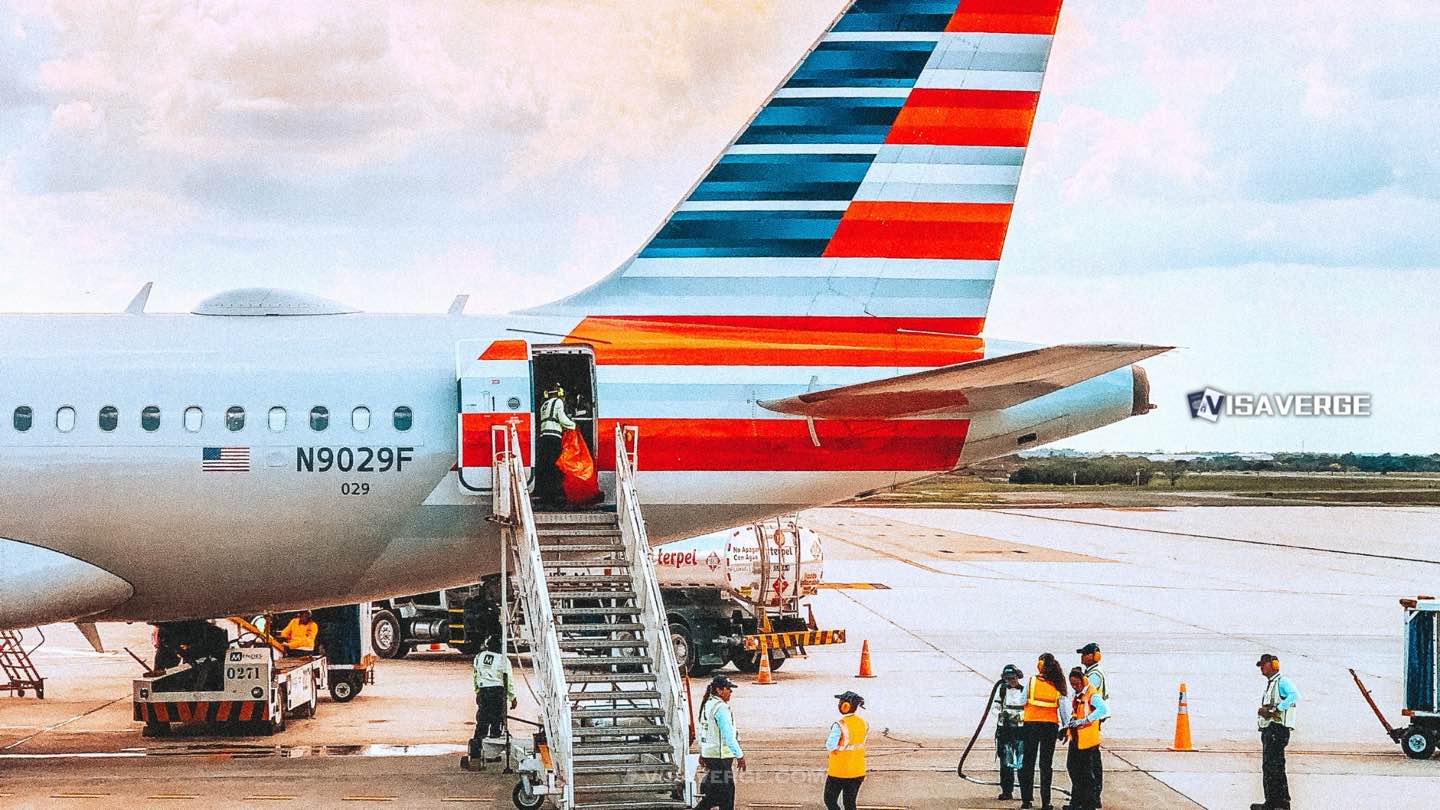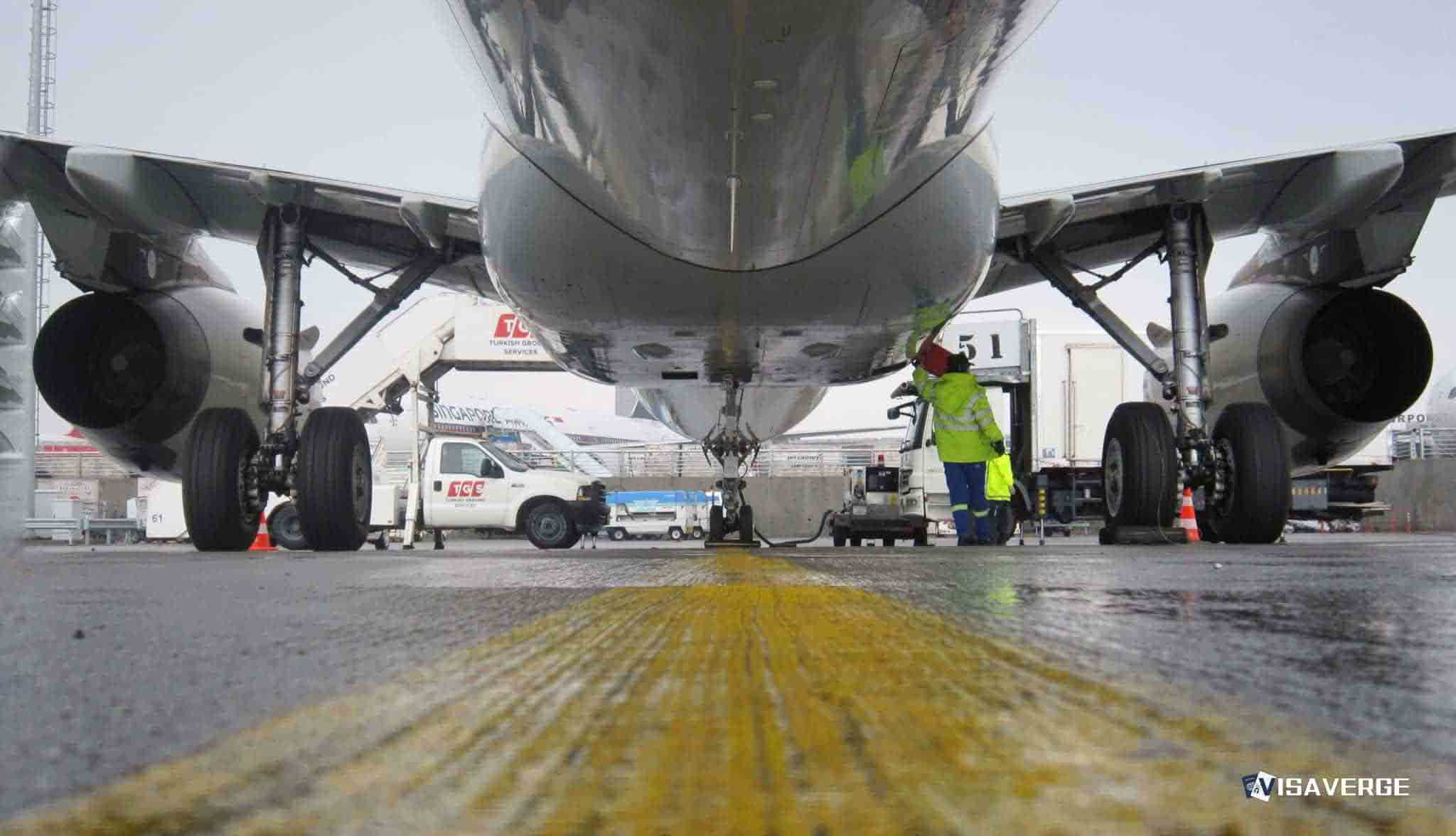Key Takeaways:
- American Airlines flight AA2421 diversion to Bahamas turned into immigration issue for passengers lacking passports.
- Deteriorating weather led to Miami circling, forced Nassau landing, causing inconvenience due to unprepared international protocols.
- Incident exposed airlines’ need for better contingency plans, communication during unexpected international air travel diversions.
On August 10, 2024, an unexpected turn of events unfolded when American Airlines flight AA2421 from San Juan, Puerto Rico 🇵🇷 to Miami, Florida 🇺🇸 was diverted due to severe weather conditions. This routine journey between U.S. territories transformed into a complex immigration quandary when the aircraft was redirected to Nassau, Bahamas 🇧🇸. The diversion led to an international incident, where passengers without passports inadvertently found themselves in a foreign nation.
Originally scheduled to depart San Juan at 5:30 PM, the flight faced deteriorating weather conditions mid-flight, compelling the pilot to circle Miami in hopes of an improvement. Eventually, the decision was made to land at Nassau’s Lynden Pindling International Airport at 8:44 PM. This decision, while necessary for safety, placed both the airline and its passengers in a legal and logistical dilemma. Passengers, unprepared for international travel, lacked passports, which are typically unnecessary for domestic flights within U.S. jurisdictions like Puerto Rico and the mainland.

Bahamian immigration officials adhered to strict international protocols, denying entry to those without proper identification. Passengers were confined to a secure airport area—described as a “glass box”—lacking amenities and cut off from the general airport facilities. This unprecedented situation was compounded when the flight crew “timed out,” reaching legal limits on their working hours, necessitating a fresh crew from Miami to continue the journey.
American Airlines faced significant operational hurdles while coordinating with Bahamian authorities, U.S. consular services, and their own logistics teams. Initial promises of a replacement flight within two hours proved overly optimistic. Delays mounted, with passengers increasingly frustrated by the lack of clear communication from the airline. This frustration was magnified by passengers’ inability to contact family or the airline due to lack of international cell service and language barriers, exacerbating confusion and distress.
In this period of uncertainty, passengers remained in the secure area without adequate food, water, or necessities for nearly 14 hours. It took seven hours before basic provisions, such as water and biscuits, were distributed—largely through efforts by fellow passengers rather than airline personnel—highlighting a critical lapse in on-ground support.
This incident laid bare significant deficiencies in contingency planning for American Airlines and broader industry practices. While weather-related flight diversions are not uncommon, the unique combination of a domestic-origin flight landing in a foreign country, amidst passengers without proper documentation, revealed critical gaps in current protocols. Such incidents demand thorough preparedness to prevent situations where passengers inadvertently become “illegal immigrants” due to unforeseen circumstances.
American Airlines’ response to the crisis drew scrutiny. Conflicting information regarding passenger status and travel arrangements led to confusion and dissatisfaction. Some passengers were initially told they were rebooked, only to find no such bookings existed. This lack of coordinated information dissemination underscored deficiencies in the airline’s emergency communications.
Eventually, resolution arrived when a relief flight was dispatched from Miami, arriving the morning after the ordeal began, on August 11. Passengers were transported to Miami around noon, although many faced further complications in reaching their final destinations. Upon arrival, reports of inconsistent customer service further marred American Airlines’ handling of the situation. While some passengers received assistance via hotel vouchers and rebooking help, others claimed they were left to arrange onward travel independently, incurring unexpected costs and logistical challenges.
This incident highlighted numerous critical issues in air travel and international protocols. Firstly, there is an evident need for airlines to have better contingency plans for scenarios where domestic flights may inadvertently divert to international locales. Secondly, it underscores the importance of robust communication strategies during irregular operations, particularly when language barriers are present. Further, there is an urgent need for improved management of passenger needs during protracted delays when confined to restricted areas of foreign airports.
Additionally, the complexities of international travel laws and the unexpected transformation of passengers into “illegal immigrants” due to force majeure events raise intricate questions about liability and passenger rights. While airlines aren’t typically accountable for weather-related disruptions, the unique circumstances of this case challenge the usual interpretations of such exemptions.
Following the incident, American Airlines issued an apology, acknowledging the inconvenience caused to passengers. The airline committed to reviewing its procedures, aiming to enhance communication and support systems during irregular operations.
This scenario serves as a poignant example of the uncertainties and challenges inherent in international aviation. It underscores the necessity for continuous improvement in airline operations, emergency preparedness, and international aviation cooperation. Industry stakeholders must consider revising policies to create special provisions for passengers inadvertently stranded in foreign countries without appropriate documents, improving communication systems, and training staff to effectively manage such complex emergencies.
For further information on travel procedures and documentation, the Bahamian government’s page on entry requirements provides authoritative insight on the official visa application process. Passengers and airlines alike must remain informed about the complexities of travel protocols to mitigate potential disruptions in increasingly interconnected air travel networks.
Ultimately, incidents like the diversion of American Airlines flight AA2421 highlight the intricate balance required in the aviation sector—to ensure safety while addressing passenger rights and needs in unforeseen circumstances. Stakeholders must work collaboratively to refine protocols, reinforcing resilience in airline operations amidst the dynamic challenges presented by global travel.
Learn Today:
- Immigration Quandary: A complex and challenging situation involving immigration laws and regulations, especially when passengers unexpectedly find themselves in a foreign country without the necessary documentation, as exemplified by the unplanned diversion of a flight to an international destination.
- International Protocols: Set rules and procedures that countries follow to manage the entry and exit of people across borders, including requirements for passports and visas. In this context, Bahamian immigration officials adhered strictly to these protocols upon the unexpected arrival of a diverted flight.
- Force Majeure: A legal concept referring to unforeseeable circumstances that prevent someone from fulfilling a contract. In aviation, these are events like severe weather, which led to the diversion of flight AA2421, complicating the passengers’ legal status in a foreign country.
- Contingency Planning: The proactive preparation and development of strategies to address unexpected events and emergencies. The American Airlines incident highlighted deficiencies in such planning when a domestic flight required international diversion.
- “Illegal Immigrants”: A term used to describe individuals residing in a country without legal permission. In this scenario, passengers on a diverted flight were technically in this status while confined in a foreign airport due to insufficient travel documentation.
This Article In A Nutshell:
On August 10, 2024, severe weather diverted American Airlines Flight AA2421 from Puerto Rico to Miami, landing unexpectedly in Nassau, Bahamas. Passengers without passports faced immigration troubles, stranded in a secure area for 14 hours. This highlighted significant gaps in contingency planning and communication for airlines amid unforeseen diversions.
— By VisaVerge.com
Read More
1. New Rule Prohibits Airline Fees for Parents Sitting with Kids
2. Top 10 U.S. Airlines Most Likely to Misplace Your Luggage
3. Decoding PNR on Your Airline Ticket
4. Understanding Open-Jaw Airline Tickets: What You Need to Know
5. A Guide to Bulk Fares for Airline Tickets








